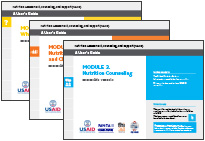
The NACS User’s Guide is a series of modules that provide program managers and implementers with a package of essential information and resources on the nutrition assessment, counseling, and support (NACS) approach. These modules are living documents and will be updated as appropriate when new evidence, guidelines, or field experience emerges. Readers are invited to submit comments and suggestions for improving or updating the guidance.
Module 1. What Is NACS?
Module 1 describes the NACS approach, its components, the evidence supporting the approach, as well as the importance of NACS throughout the life cycle.
Module 2. Nutrition Assessment and Classification
Module 2 explains the rationale for and different types of nutrition assessment and provides guidance on when and how to conduct assessments.
Module 3. Nutrition Education and Counseling
Module 3 offers an overview of nutrition education as well as information and tips on providing effective nutrition counseling and developing nutrition care plans. The module covers topics including nutrition during pregnancy and illness; infant and young child feeding; and water, sanitation, and hygiene.
Module 4. Nutrition Support
Module 4 covers the main nutrition-specific and nutrition-sensitive interventions for preventing and treating malnutrition.
Module 5. Monitoring and Evaluation of NACS Services
Module 5 introduces the basic principles of monitoring and evaluation (M&E) and explains why they are important for NACS activities. It provides guidance on selecting indicators to include in an M&E plan and how to collect, analyze, and use these data.
Module 6. Quality Improvement for NACS
Module 6 provides guidance on using quality improvement to assess the quality of NACS services, and improve outcomes for patients receiving those services.
Module 7. NACS Planning
Module 7 provides guidance on planning the integration of nutrition services into routine facility-based health care and community-based services using the NACS approach. It draws from the experience of countries and practitioners that integrated NACS into health systems and references tools such as the NACS Planning and Costing Tool.


